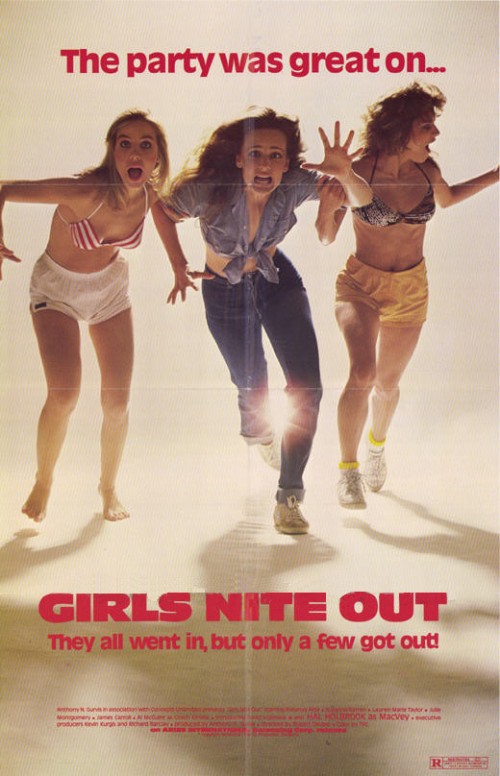
By Richard Winters
My Rating: 5 out of 10
4-Word Review: Scavenger hunt turns deadly.
After the DeWitt university basketball team wins the championship the female students go on an all-night scavenger hunt using clues given to them at regular intervals by the DJ at the college radio station, who they listen to via portable radios. During the event many of the participants turn-up dead having been murdered by a killer dressed in a bear costume. No one knows who it is, but many suspect it might have something to do with Dickie Cavanuagh who murdered his girlfriend Patty, the daughter of the school’s security guard Jim (Hal Holbrook), in a jealous rage years earlier and has ever since been locked away in a mental hospital.
The plot is similar to Midnight Madness, but the scavenger hunt in that one was done in a much more vivid way and a had a wider variety of locales while this one occurs in a limited setting making it visually quite boring. Much of the reason for this was because Upsala College gave the producers only one weekend to film forcing them to cram the entire shoot into a 3-day period and causing much of the cast to work 24-hour shifts in order to get it done while Hal Holbrook did his part separately and only interacts with the cast once in a scene where he has a brief exchange with his real-life son David Holbrook, who plays one of the suspects.
Given that it’s actually quite impressive how good the performances are, but everything else, including the poor pacing, is rock bottom. Way too much time gets spent on the set-up including boring scenes at a campus party that aren’t engaging. The actual hunt doesn’t get going until almost 40-minutes in even though it should’ve begun with the hunt right away while nixing the early conversations and characters that add little to the suspense.
The film also suffers from a musical soundtrack made up entirely of bubblegum bands from the 60’s like The Lovin’ Spoonful, The Ohio Express, and 1910 Fruitgum Co., which all had a sound that was by the early 80’s completely out-of-touch and something no self-respecting college kid would be caught listening to. Especially at a college party where the idea is to play recent hits that are trending and not dancing to songs that sound like jingles from a commercial. Personally I like The Lovin’ Spoonful, but their style was dated by that time, so it seemed weird that was the only band that the college radio station ever played, which would’ve had none of the students listening to them if that was all they were going to hear.
Things do pick-up once the murders get going. Some critics complained that the killings are unimaginative and are handled in a routine way, which they are, but I did like the killer’s weapon that’s fashioned to look like a bear claw using knives in place of the paws and similar to what Freddy Krueger later used in Nightmare on Elm Street. The identity of the killer is also a surprise, so it scores a few points there, but overall it’s still no better than the hundreds of other slashers that were released around the same time.

Alternate Title: The Scaremaker
My Rating: 5 out of 10
Released: December 3, 1982
Runtime: 1 Hour 36 Minutes
Rated R
Director: Robert Deubel
Studio: Independent-International Pictures
Available: DVD













